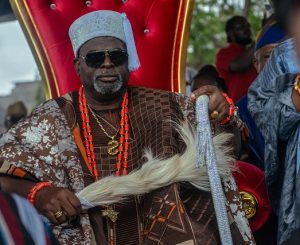Alhaji Rashad Peregrino-Brimah, a family elder about to present the swords to Nii Aborla for the oath-swearing
The Yoruba community in Ghana last Sunday hosted a colourful coronation for its recently turbaned Chief or Oba in Accra.
Oba Alhaji Abdul Rashid Brimah IX succeeded Chief Hamza Peregrino-Brimah VIII who passed on last year.
The highlight of the occasion was the re-presentation of the 115-year-old swords of office to the new occupant of the seat of office by a representative of the Ga Mantse, King Teiko Tackie Tsuru II.
The two swords, a large one and a small one, originated from the reign of the legendary King Tackie Tawiah I who appointed Chief Brimah I as the head of the Islamic community in Accra in 1908. The King could not witness the coronation of the man he appointed before he passed on.
The large sword was the object of authority bestowed upon Chief Brimah by King Tawiah I, and the small one to be used in swearing into office subservient chiefs within the Islamic community.
Chief Brimah I was also the Sarkin Musulmi, which in Hausa means head or chief of Muslims in Accra.
Heads of the Yoruba community from as far as Tamale and Kumasi, including Sekondi and the Volta Region attended the function.

Oba Abdul Rashid Brimah IX
When he administered the oath of office using the over a century-old sword, the representative of the Ga Mantse, Nii Aborla, said the new chief will be expected to respond to the summons by the Ga King anytime that becomes necessary.
Following his assumption of office, Oba Abdul Rashid bestowed titles on some personalities in the Yoruba community through whom he would discharge his traditional functions.
Chief Brimah I passed on to eternity in 1915. At the time of his death, the Governor of the Gold Coast at the time was scheduled to travel but had to postpone briefly the trip to express his condolences to the family of the deceased.
Representatives of the two main political parties, the New Patriotic Party (NPP) and National Democratic Congress (NDC) graced the occasion with messages from their leaders.
By A.R. Gomda


